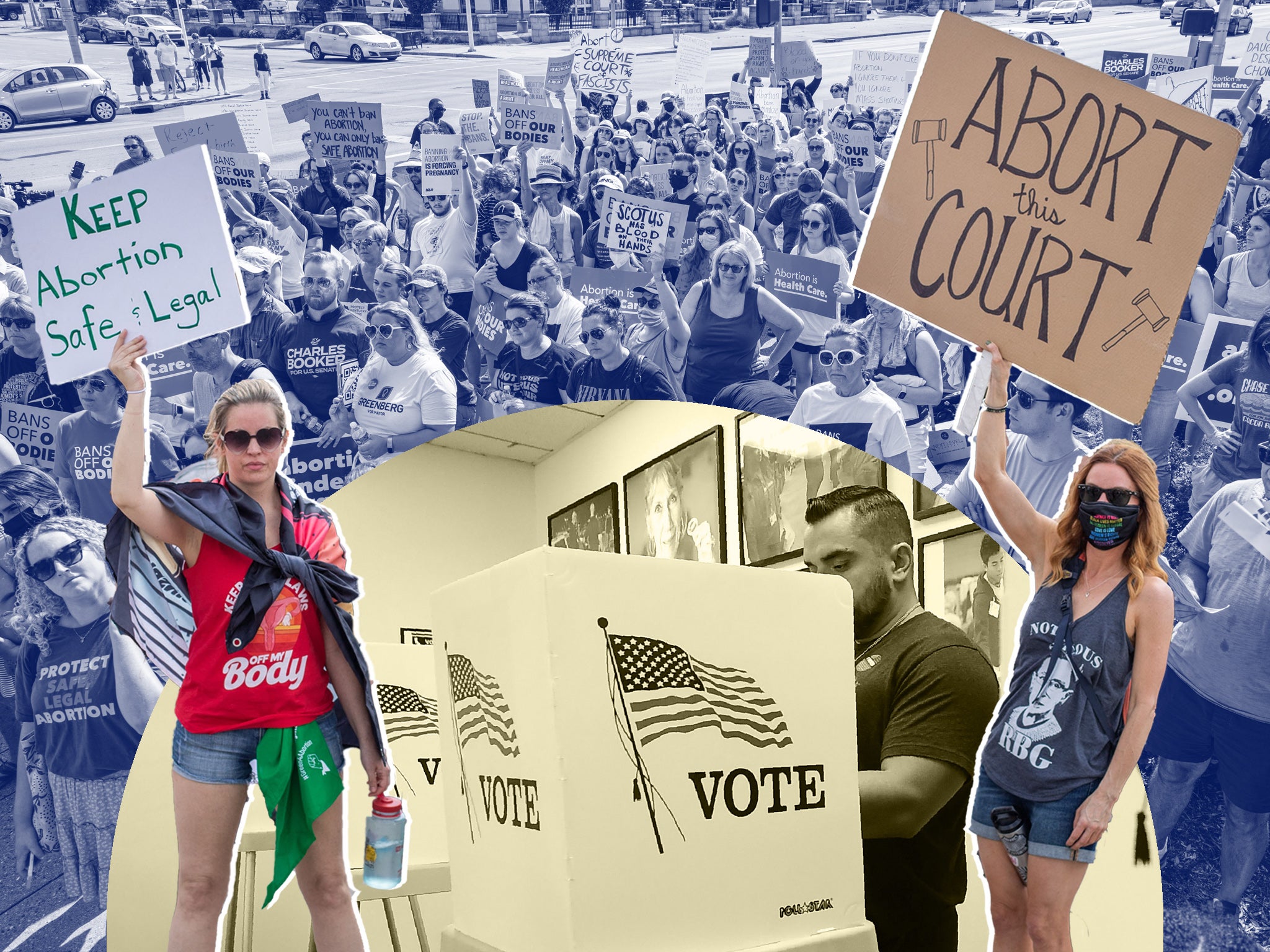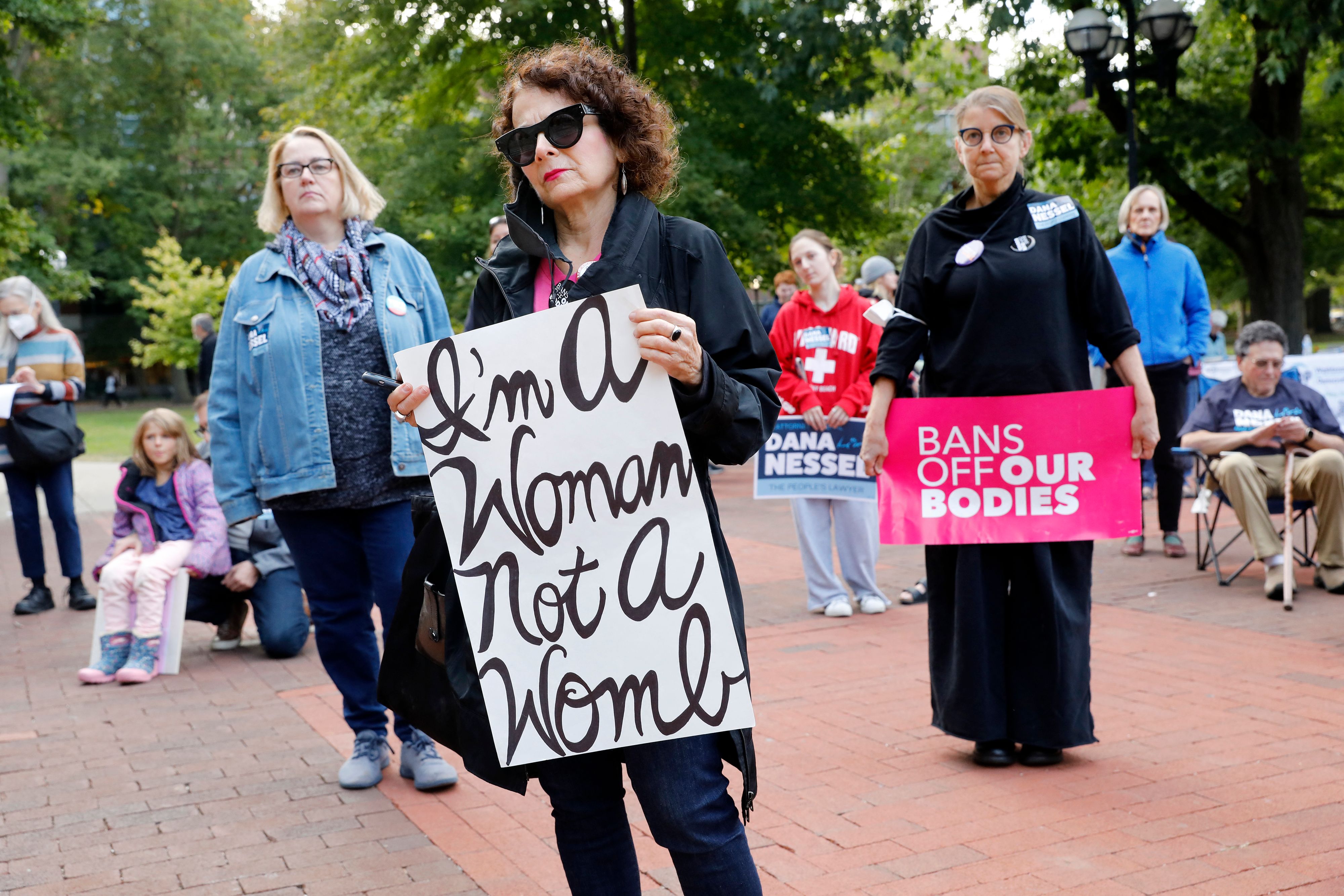The future of abortion care is on the ballot in these five states
Americans will vote in a historic sweep of reproductive healthcare referendums after the Supreme Court revoked the constitutional right to care, Alex Woodward reports


Less than two months after the US Supreme Court struck down the constitutional right to abortion, Kansas voters shocked the country – and a multimillion dollar anti-abortion campaign – with the results of America’s first referendum on abortion rights after the high court’s landmark ruling.
In August, voters rejected a Republican-proposed state constitutional amendment that would gut protections for abortion care in Kansas, a “red state” that went for Donald Trump in 2020, and which anti-abortion activists anticipated would kickstart a nationwide campaign to end legal abortion after the decades-long movement to gut Roe v Wade finally got what it wanted from the Supreme Court.
Instead, Kansas voters underscored the deep unpopularity of political interference with bodily autonomy and reproductive healthcare, signalling a wave of midterm elections centred around the high stakes for abortion rights across the US, from the future of state-level access, to threats of a nationwide abortion ban with Republicans in control of Congress.
This fall, voters in five states will vote directly on measures related to reproductive healthcare.
If approved, voters in California, Vermont and Michigan could be the first to enshrine an explicit right to abortion care in their state constitutions.
In Kentucky, abortion rights advocates hope to recreate the success of the Kansas campaign by shooting down a constitutional amendment that would deny residents that same right.
And in Montana, voters will weigh in on a so-called “born alive” measure backed by anti-abortion activists, with far-reach implications for families suffering pregnancy complications.
Americans across the US will be also voting for candidates at the state level – from legislators to secretaries of state and governors – who will be crucial in deciding future state legislation to outlaw or severely restrict access, now that the Supreme Court has revoked overarching constitutional protections and handed those critical decisions back to individual states.
But state-level measures that expand or protect access could be pre-empted by threats of a national abortion ban like the one proposed by Republican Senator Lindsey Graham, despite GOP’s feigned insistence that the issue should be left up to states to decide.
On 18 October, President Joe Biden said he will make federal protections for abortion care his first priority in 2023 – if Democratic members of Congress hold on to their majority and can pass legislation that codifies Roe.
“Without a federal right, either statutory or a new federal constitutional right, there is no way to assure that the majority of people in the US will be able to assert their bodily autonomy and access abortion care,” Elisabeth Smith, director of state policy and advocacy with the Center for Reproductive Rights, tells The Independent.
In the months after the Supreme Court’s June decision in Dobbs v Jackson Women’s Health Organization, patients and providers have shared horror stories about losing access to abortion care and testified to Congress about the dramatic ripple effects felt across the US in the wake of the ruling.
“People are being forced to confront all of the concentric circles and all the effects of the Dobbs decision,” Ms Smith tells The Independent. “I think we’re going to see Americans really stand up and say, ‘You can’t take my bodily autonomy away. You can’t take my reproductive rights. You can’t tell me that I don’t get to decide what the course of my life looks like.’ How that will manifest in each individual place, I don’t know. But I think in terms of the ballot initiatives we’ve been discussing, we will see people determined to make their voice heard.”
Michigan
Petitioners broke a state record collecting thousands of signatures to get a measure on Michigan ballots that would amend the state’s constitution to enshrine the right to access abortion and birth control.
Michigan voters will decide whether “every person has the fundamental right to reproductive freedom, which involves the right to make and carry out decisions without political interference about all matters relating to pregnancy, including birth control, abortion, prenatal care, and childbirth.”
The measure would also “ensure that all Michiganders have the right to safe and respectful care during birthing, everyone has the right to use temporary or permanent birth control, everyone has the right to continue or end a pregnancy pre-viability, and no one can be punished for having a miscarriage, stillbirth, or abortion.”
Advocacy group Reproductive Freedom for Fall submitted a petition in support with more than 750,000 signatures – above and beyond the threshold for getting the referendum on ballots this fall – but it was shot down by two Republicans on a four-member state board because of a spacing issue on the proposal.
The state Supreme Court reversed the decision last month, determining that the state’s Board of Canvassers has a “clear legal duty to certify the petition” and allow the question to appear on ballots.
If Michigan voters adopt the amendment, it could preserve the state’s role as a critical point of care in the Midwest, where patients have an increasingly narrow

Other midwestern states are enforcing “criminal, total criminal abortion bans, or it’s difficult to get abortion care,” or, in states like Wisconsin, abortion laws lack clarity, leading providers to stop providing care altogether, Ms Smith tells The Independent.
“If Michigan voters were to pass the constitutional amendment, it would ensure access for Michiganders, but also for people in surrounding states,” she says.
Montana
Montana voters will be asked to vote “yes” or “no” on a pair of statements in a referendum approved by Republican lawmakers: that “infants born alive, including infants born alive after an abortion, are legal persons,” and that health providers are required to “take necessary actions to preserve the life of a born-alive infant.” Providers could face up to 20 years in jail and a $50,000 fine.
Critics argue that the measure is intentionally misleading.
Killing an infant is illegal. Anyone who “purposely, knowingly, or negligently causes the death of a premature infant born alive, if the infant is viable” already faces criminal penalties under the law.
But the measure raises the baseless spectre among anti-abortion activists that children are “born alive” after “failed” abortions and then killed.
“Those laws turn on abortion stigma, and suggest that that babies are born after failed abortions, and doctors then don’t provide emergency care. All of that is fake. All of that is false. It does not happen,” Ms Smith tells The Independent. “But I think it’s clear that in Montana, anti-abortion lawmakers want to see how far the state will go to vote on a statewide referendum that is seemed to restrict abortion.”
Dozens of medical professionals and families who have lost their children have joined the Montana chapters of the American College of Obstetrics and Gynecology and the American Academy of Pediatrics to urge opposition to the measure.
The measure amounts to government-mandated “aggressive treatment for newborns for whom no amount of medical care will save, and may instead prolong suffering and severely disrupt families’ grieving process” and deny those families “the choice to spend precious time with their infant, even to provide spiritual care,” according to an open letter signed by more than 700 providers in the state.
“This has nothing to do with abortion,” they wrote. “The reality is that this represents government interference in the patient-physician relationship at times when families need compassionate care and trust in their health care professionals the most. There are so many reasons that an infant may be delivered with no chance of survival – rupture of membranes at a previable gestational age, lethal anomalies of the heart, kidneys, lungs or nervous system, maternal health emergencies … and this bill pushes a one-size-fits-all mandate that will cause real harm to these babies, mothers, and families.”
Kentucky
Voters in Kentucky will determine whether to amend the state’s constitution to say that nothing in it protects the right to an abortion, echoing the proposal that Kansas voters overwhelmingly rejected in August.
Abortion care is illegal in Kentucky, except in pregnancies to protect the life of the patient.
But the future of abortion care hinges on legal challenges to state laws and whether courts agree that the state’s constitution provides Kentuckians the right to access that care.
A so-called “trigger” law that bans abortion in the state without Roe protections was enacted after the Supreme Court’s ruling. In August, Kentucky’s Supreme Court allowed the state’s ban on abortions at roughly six weeks of pregnancy to stand, along with the “trigger” law.
But oral arguments in that legal challenge won’t begin until after Election Day – on 15 November.
If voters approve the amendment, the measure would preempt any state court from affirming abortion rights, effectively shutting down legal challenges from abortion rights advocates and providers in the wake of the Dobbs decision.
Changing the law in the middle of that litigation “would be devastating” to providers and patients, Ms Smith tells The Independent.
Protect Kentucky Access, a coalition of groups opposing the amendment, is spearheaded by campaign manager Rachel Sweet, who successfully led a similar effort in Kansas. The group recently reported raising more than $1.25m over the last month for a total of $3m.
“Momentum and fundraising are on our side,” Ms Sweet said in a statement. “The rights of Kentucky women to make their own private medical decisions free from government interference are on the line this November.”
California and Vermont
Neither California nor Vermont have an explicit constitutional right to abortion, but both states allow for legal abortion care – at all stages of pregnancy in Vermont and up to roughly 24 weeks in California.
California voters will decide whether to amend the state’s constitution to prohibit the state from interfering with “reproductive freedom,” including the right to abortion.
Vermont voters will determine whether the state’s constitution should establish a right to “personal reproductive autonomy.”
If those measures are approved, it would be all but impossible for state lawmakers to advance abortion bans or restrictions.
Join our commenting forum
Join thought-provoking conversations, follow other Independent readers and see their replies
Comments




Bookmark popover
Removed from bookmarks